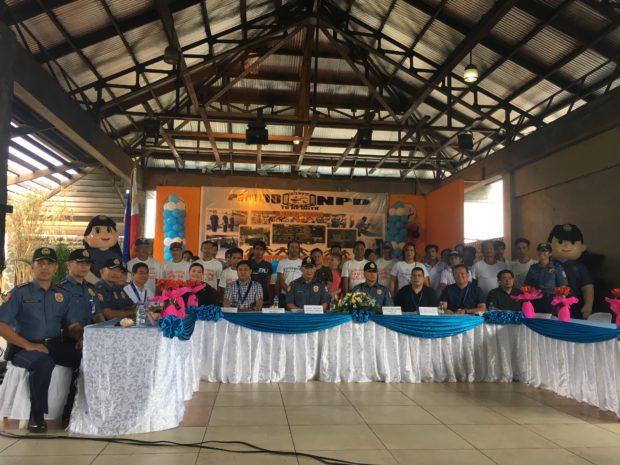
At least 80 drug dependents across Camanava (Caloocan, Malabon, Navotas and Valenzuela) enroll themselves in the Northern Police District’s “Kanlungan ng Pagbabago” program, a monthlong rehabilitation program designed for small-time users to get over the vice and start a new life. (Photo by KRIXIA SUBINGSUBING / Philippine Daily Inquirer)
For most people, having their names on their barangays’ watch list often meant deadlier chances of getting caught in the crossfire as the government and police wage their bloody war on drugs.
It’s that shadow that 55-year-old Manuel Abelgas, himself a worker for his own village hall, is still trying to live with after being included in Barangay North Bay Boulevard South’s list.
“I got included after I tested positive during one of the barangay’s drug tests,” he told the Inquirer, admitting that he does use “shabu” occasionally with friends. “It’s both embarrassing and terrifying, knowing all the horror stories [about the drug war].”
Wanting to clear his name, Abelgas and 80 other drug dependents from northern Metro Manila trooped to the old Caloocan City Hall on Friday for a shot at getting their names off the list.
They are among the first batch of “reformers” under the Northern Police District’s (NPD) newly launched “Kanlungan ng Pagbabago” – a rehabilitation program to help small-time drug dependents to turn away from the vice.
But more than healing and recovery, the program offers a more lasting promise: their removal from their lists so they can combat the drug stigma, said Chief Supt. Amando Clifton Empiso, NPD director.
“Our commitment to the war on drugs isn’t just solely in the operational implementation of the [Comprehensive Dangerous Drugs Act]. It’s to manifest also our vision to help rehabilitate drug dependents into becoming productive members of society again,” Empiso said in an earlier interview with the Inquirer.
“I want to free myself from the stain of being tagged as a drug user in my community,” Abelgas. said. “It’s hard to look for work when they know you are a user.”
“Hopefully with my husband’s surrender we can all sleep at night knowing he is safe and ready,” said Abelgas’ wife. “It’s hard to constantly have to watch your back especially with that kind of reputation.”
Senior Supt. Benjamin Silo, former Bataan provincial director and now NPD chief directorial staff, said the program was inspired by a similar project in his previous assignment.
Under “Kanlungan,” Silo said, the surrenderees would be provided monthlong sanctuary in a reformation center set up across Camanava: one each in Barangay 178 Tala, Caloocan; in Barangay North Bay Boulevard South, Navotas; and Letre, Malabon.
There they will undergo medical, psychological and counseling sessions from the Department of Health, and even livelihood and skills training from the Department of Education and Technical Education Services and Development Authority.
The program also seeks to augment the dearth of resources for the more than 52,000 drug surrenderees from across the Camanava (Caloocan, Malabon, Navotas and Valenzuela) over which the NPD has jurisdiction, Empiso said.
Currently, each LGU has their own rehabilitation program. But most of them are done in coordination with and under the auspices of their own parish churches.
Silo said they hoped to establish more reformation centers through the year to better reach out to the thousands needing rehabilitation.
“In Bataan, we had 13 reformation centers which was why we were able to graduate 300 to 400 a month. We are hoping to build at least one per police precinct here as well,” he said.
But for now, reformists like 62-year-old Renato dela Cruz, a fisherman from Barangay Tanza, could look forward to a second chance within the comforts of their new sanctuary.
“I don’t consider myself an addict, just hard up with life. That doesn’t make me a bad person,” he said.
Dela Cruz admitted feeling terrified the first time Navotas police reached out to him to enroll under the program. “Pero buti may mga ganito silang program, parang naniniwala sila sa amin. Kakayanin naman para sa mga anak,” he said.